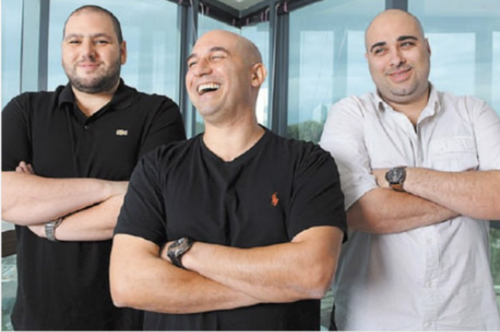
Just months before secretive Israeli spyware company NSO Group required an emergency bailout and its equity was declared worthless, Big Four accounting firm EY valued the privacy-invading enterprise at $2.3 billion, the Financial Times has reported:
"The EY valuation, more than twice what NSO had been valued at two years earlier, was made by analysts in the firm’s Luxembourg office in July last year, according to documents seen by the Financial Times. The estimate of NSO’s enterprise value was made without visiting the company or verifying the information its analysts had been provided."
The valuation by EY—known as Ernst & Young until 2013—came at a time when NSO was facing shrinking revenue, lawsuits, public condemnation and harsh media scrutiny over its Pegasus spyware, which had been used by various governments against activists and journalists. Two female associates of Saudi-slaughtered journalist Jamal Khashoggi were reportedly among those targeted.
By October, NSO required an emergency $10 million loan. In December—just four months after the $2.3 billion valuation had been finalized by EY in August—creditors informed NSO's majority stockholders that the firm was insolvent.
"Pegasus allows operators to clandestinely surveil a suspect’s mobile phone—access contacts and messages, as well as the built-in camera, microphone, and location history," reported the Epoch Times. Strikingly, the spyware reportedly can be transmitted by sending a link to a phone in a way that creates no notification, and activated without the phone's owner doing anything at all.
Earlier this year, Berkeley Research Group, working for NSO's private equity owners, declared the company's equity "valueless"
On May 31, the Financial Times reported that, with the company in a "financial spiral" and struggling to meet payroll, "foul-mouthed CEO" Shalev Hulio alarmed a group of investors when he said he was contemplating selling the spyware to governments previously flagged as posing "elevated risk" of misusing it.
NSO has sold the spyware to dozens of countries, including many authoritarian governments. In addition to the United States and Israel, NSO's long list of clients reportedly includes Saudi Arabia, UAE, Bahrain, Egypt, Mexico, South Africa and India. Last week, NSO said "at least" five European Union governments have purchased its spyware, and that the firm canceled one of the contracts after an EU country misused it.

NSO—a name derived from the first names of its founders—Niv Karmi, Shalev Hulio and Omri Lavie—says all its sales are subject to the approval of Israel's defense ministry. The New York Times found several instances in which the sale of Pegasus coincided with the recipient government's increased support for Israel.
NSO's value is under renewed scrutiny, as the firm entertains a spin-off of its core assets to U.S. defense contractor L3Harris. The White House objects to the proposal; the Department of Commerce had earlier barred NSO from doing business with U.S. companies. This month, Moody's withdrew its rating of NSO's half-billion dollars of junk bonds, citing "inadequate information."
NSO is the target of lawsuits filed by WhatsApp and Apple. WhatsApp, a subsidiary of Meta, says 1,400 users of its encrypted instant messaging and voice-over-IP application were targeted by NSO software.
In April, NSO asked the Supreme Court to consider an argument that the firm deserved protection from Meta under the Foreign Sovereign Immunities Act, which protects foreign governments from civil cases filed by American citizens. Last year, the 9th Circuit rejected that notion by a 3-0 vote. Judge Danielle Forrest wrote:
“The question presented is whether foreign sovereign immunity protects private companies. The law governing this question has roots extending back to our earliest history as a nation, and it leads to a simple answer—no. Indeed, the title of the legal doctrine itself—foreign sovereign immunity—suggests the outcome.”
In an interview with a Hebrew-language podcast, NSO founder Lavie blamed anti-semitism for the worldwide backlash against his firm over governments' use of its spyware against political adversaries, activists and journalists. “We have no way to know what they do with the system,” he said. “I don’t want to know. I don’t want to be an intelligence partner.”
Just months before secretive Israeli spyware company NSO Group required an emergency bailout and its equity was declared worthless, Big Four accounting firm EY valued the privacy-invading enterprise at $2.3 billion, the Financial Times has reported:
“The EY valuation, more than twice what NSO had been valued at two years earlier, was made by analysts in the firm’s Luxembourg office in July last year, according to documents seen by the Financial Times. The estimate of NSO’s enterprise value was made without visiting the company or verifying the information its analysts had been provided.”
The valuation by EY—known as Ernst & Young until 2013—came at a time when NSO was facing shrinking revenue, lawsuits, public condemnation and harsh media scrutiny over its Pegasus spyware, which had been used by various governments against activists and journalists. Two female associates of Saudi-slaughtered journalist Jamal Khashoggi were reportedly among those targeted.
By October, NSO required an emergency $10 million loan. In December—just four months after the $2.3 billion valuation had been finalized by EY in August—creditors informed NSO’s majority stockholders that the firm was insolvent.
“Pegasus allows operators to clandestinely surveil a suspect’s mobile phone—access contacts and messages, as well as the built-in camera, microphone, and location history,” reported the Epoch Times. Strikingly, the spyware reportedly can be transmitted by sending a link to a phone in a way that creates no notification, and activated without the phone’s owner doing anything at all.
Earlier this year, Berkeley Research Group, working for NSO’s private equity owners, declared the company’s equity “valueless”
On May 31, the Financial Times reported that, with the company in a “financial spiral” and struggling to meet payroll, “foul-mouthed CEO” Shalev Hulio alarmed a group of investors when he said he was contemplating selling the spyware to governments previously flagged as posing “elevated risk” of misusing it.
NSO has sold the spyware to dozens of countries, including many authoritarian governments. In addition to the United States and Israel, NSO’s long list of clients reportedly includes Saudi Arabia, UAE, Bahrain, Egypt, Mexico, South Africa and India. Last week, NSO said “at least” five European Union governments have purchased its spyware, and that the firm canceled one of the contracts after an EU country misused it.

NSO—a name derived from the first names of its founders—Niv Karmi, Shalev Hulio and Omri Lavie—says all its sales are subject to the approval of Israel’s defense ministry. The New York Times found several instances in which the sale of Pegasus coincided with the recipient government’s increased support for Israel.
NSO’s value is under renewed scrutiny, as the firm entertains a spin-off of its core assets to U.S. defense contractor L3Harris. The White House objects to the proposal; the Department of Commerce had earlier barred NSO from doing business with U.S. companies. This month, Moody’s withdrew its rating of NSO’s half-billion dollars of junk bonds, citing “inadequate information.”
NSO is the target of lawsuits filed by WhatsApp and Apple. WhatsApp, a subsidiary of Meta, says 1,400 users of its encrypted instant messaging and voice-over-IP application were targeted by NSO software.
In April, NSO asked the Supreme Court to consider an argument that the firm deserved protection from Meta under the Foreign Sovereign Immunities Act, which protects foreign governments from civil cases filed by American citizens. Last year, the 9th Circuit rejected that notion by a 3-0 vote. Judge Danielle Forrest wrote:
“The question presented is whether foreign sovereign immunity protects private companies. The law governing this question has roots extending back to our earliest history as a nation, and it leads to a simple answer—no. Indeed, the title of the legal doctrine itself—foreign sovereign immunity—suggests the outcome.”
In an interview with a Hebrew-language podcast, NSO founder Lavie blamed anti-semitism for the worldwide backlash against his firm over governments’ use of its spyware against political adversaries, activists and journalists. “We have no way to know what they do with the system,” he said. “I don’t want to know. I don’t want to be an intelligence partner.”







